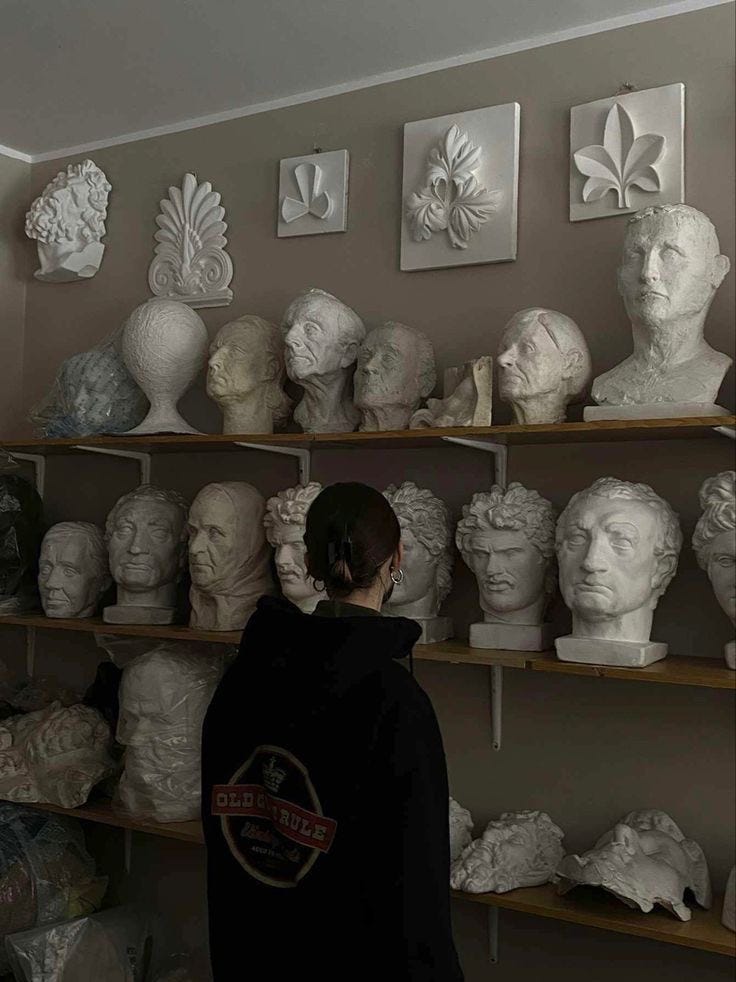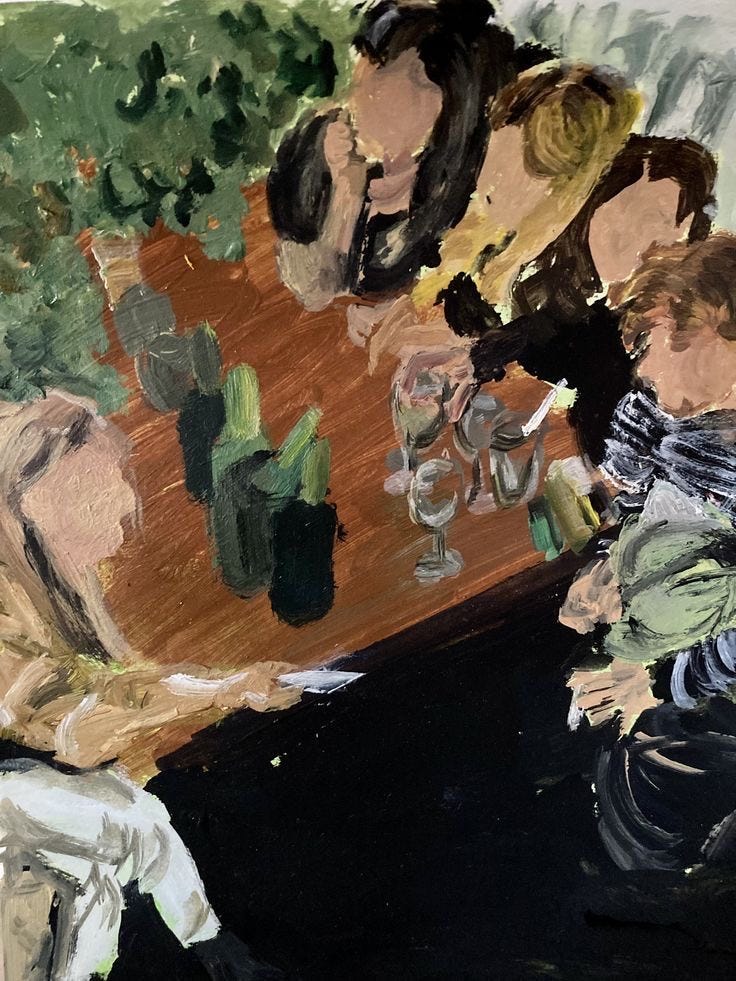there’s a certain kind of exhaustion that has nothing to do with doing too much. it’s not physical. it’s not even mental, not really. it’s the fatigue that comes from being seen. not the kind of seen that feels safe or grounding. the kind that feels like surveillance, even if no one’s looking at you that hard. it’s the fatigue of knowing you’re always being interpreted—casually, clumsily, endlessly—by people who only ever get a version of you. it’s the kind that comes from being looked at. not stared at. not admired. not even necessarily judged. just… perceived. seen, filtered, interpreted. as if simply existing in front of other people is a role you’re somehow always playing. it’s an exhaustion that doesn’t show up in your posture or your voice, but in the quiet recalibrations you do inside—making sure you’re not too much, not too little, not too something. it’s like you’re constantly translating yourself into something digestible.
and i know we all do it. we interpret. we summarize people without meaning to. we assume and project and round others down to their most obvious traits, because it’s easier than letting their complexity take up space in our heads. i get it. i do it. but knowing that doesn’t make it any easier when you realize it’s happening to you. it’s the emotional equivalent of performing for ten different audiences who are all watching different versions of the same show. and you’re expected to nail it for everyone. to be likable, digestible, coherent. to be explainable.
i’ve noticed i get tired after even the gentlest social interactions. not because anything went wrong, but because something happened under the surface. an invisible process. i wasn’t pretending. but i was managing. my facial expressions, my tone, how open or guarded i was being. there’s a form of self-awareness that starts out as emotional intelligence and slowly slips into performance. and what’s confusing is that you’re not lying. you’re not hiding. you’re simply adjusting. editing. checking the mirror of other people’s responses. it’s something many of us—especially women, especially sensitive people, especially anyone who’s ever been misread—get very, very good at.
we don’t talk enough about the invisible labor of being understood. the work of predicting how you might be perceived and modifying yourself accordingly. in psychology, they call it “impression management.” in real life, it looks like softening your opinion in a group, adding disclaimers to a story, smiling even when you’re not fully sure what you’re agreeing with. and it’s not always about insecurity. sometimes it’s about survival. sometimes it’s about being a human in a room full of interruptions. sometimes it’s about being a person of colour in a non-inclusive university. sometimes it’s about being the person who always plays peacekeeper, because no one else will. and the problem with being explainable is that it requires you to constantly flatten your contradictions. to make yourself easier to follow. to pause and think, “how will this come across?” before you finish a sentence. we do this in conversation. on the internet. in dating apps. in work emails. we soften our edges so we’re not too much. we add disclaimers so we’re not misunderstood. we filter what we say through invisible narratives we didn’t write, but are afraid to challenge.
i once spent an entire dinner party worried that my quietness was coming off as cold. i wasn’t in a bad mood. i wasn’t judging anyone. i just didn’t have the energy to perform clarity that night. but still, the pressure sat there, low and silent, reminding me that neutrality can be read as indifference. that my softness can look like distance if i’m not careful. and so i smiled a little too hard. nodded too often. answered questions like i was being interviewed. and went home feeling like i’d rented out a version of myself for a few hours. the kind of self who was pleasant and contained and impossible to misunderstand. and it made me feel lonely in a way that didn’t show up until later, in the shower, when i exhaled for the first time all evening.
being perceived isn’t just tiring because it invites judgment—it’s tiring because it demands consistency. you start to feel like you owe people the version of you they’re used to. the calm one. the smart one. the resilient one. the one who doesn’t mind. and even if that version is true, it isn’t the whole truth. but the fear of confusing people—or disappointing them—keeps you performing it anyway. you become fluent in your own curation.
that’s the thing about being perceived—it’s not always about being liked. it’s about being decoded. it’s about the emotional labor of making sure people understand who you are before they make up their minds. and for people who grew up being misread, that labor becomes habitual. especially if being misinterpreted once cost you something. love. friendship. safety. belonging. so now, we narrate. we explain. we anticipate reactions before they happen. we apologize mid-sentence for how something might sound.
what’s strange is that this hyper-awareness of self often comes from a good place. you want to be thoughtful. you want to be considerate. you want to be understood. but somewhere along the line, it becomes something heavier. you stop asking, “is this true for me?” and start asking, “how will this come across?” the internal monologue shifts from presence to prediction. from self-expression to self-editing.
and if you’ve ever been deeply misunderstood, you know how lasting that ache can be. maybe you were called too intense. or too cold. or too emotional. maybe someone took the softest part of you and decided it was manipulation. maybe you tried to explain yourself once and it backfired so hard you decided it wasn’t worth it anymore. so now you preempt everything. you explain before they can assume. you qualify your emotions. you pad your opinions in velvet. all to avoid the sting of being seen wrong.
sometimes i wonder if this is particularly generational. if millennials and gen z are just chronically tired of being perceived because we’ve grown up constantly watching ourselves. through front-facing cameras. through curated bios. through story views and comment sections and algorithmic guesses about who we are. our lives aren’t just lived anymore—they’re broadcast, captioned, reflected back. and the reflection doesn’t always feel true. it feels like a ghost version of you that people interact with instead. the “you” that posts. the “you” that texts a certain way. the “you” that didn’t laugh in that one moment and was labeled distant ever since.
the worst part is you start to internalize that ghost version. you start editing yourself preemptively, not even realizing you’re doing it. you wear outfits that match who you think people believe you are. you phrase things in ways that won’t confuse anyone. you tell stories that paint you as the kind of person who makes sense. because somewhere along the way, making sense started to feel like survival.
on the other hand, sometimes i think about all the versions of me that exist in other people’s heads. the girl who’s aloof. the girl who’s gentle. the girl who’s intimidating. the girl who’s shy. the girl who’s too much. the girl who’s not enough. none of them are wrong, exactly. but none of them are whole. and i can’t correct them all. that’s the thing—being misunderstood doesn’t make you untrue. it just makes you unseen. and that, in its own genuine way, is a kind of grief.
but at what cost?
i think about how often i’ve over-explained things just so someone doesn’t assume the wrong thing. how often i’ve softened a sentence just in case it came off too sharp. how many versions of myself i’ve filtered depending on the room, the context, the level of safety. and what’s funny is: most people don’t even notice. they don’t realize you’re managing all of that in real time. they just experience the curated version and respond accordingly. and then you go home wondering if the real you got lost in translation.
the older i get, the more i realize that not every misunderstanding needs a rebuttal. not every version of me floating out there needs a press release. some people will never hear my tone the way i meant it. some will never read between the lines. some will project their own lens onto my softness and turn it into fragility. others will take my stillness and call it cold. and honestly? that’s okay. perception is always personal. it says more about the viewer than the viewed.
and yet, it’s hard to let go of the desire to be understood. because when someone does get you—the real you—it feels like exhaling after holding your breath for hours. it’s rare. and it’s sacred. and maybe that’s why we chase it so hard. but there’s a kind of freedom, too, in not trying so hard. in letting yourself be a little blurry to others, so you can be sharp to yourself. in choosing peace over perfect clarity.
there’s a quote i love by zadie smith. she says, “people don’t want to be understood. i mean, not entirely. it’s too destructive. then they haven’t got anything left.” i think about that often. maybe the fear of being perceived isn’t just about being misread—it’s about being fully seen. and maybe, deep down, that’s terrifying. because what if someone sees all of you and still doesn’t like it?
but still—there’s a kind of power in unpolished presence. in letting yourself be a little messy in front of others. in saying something without overexplaining it. in sitting in silence without rushing to fill it. in wearing what makes you feel good even if it’s not “your usual vibe.” in showing up without a script. in letting people think what they will, and still choosing to show up again tomorrow.
the truth is, not everyone needs the full picture. not everyone deserves it, even. some people will only read your caption. some people will get the first draft of you. some people will mistake your softness for weakness, your boundaries for distance, your stillness for disinterest. and still, you remain.
you are not a collection of perceptions. you are not a highlight reel of what’s easiest to understand. you are a whole story. and not everyone will read it. and that’s okay.
lately, i’ve started to let go of the pressure to be understood in full. i’ve started to make peace with the idea that i will be misread sometimes. that i might come off distant when i’m deep in thought. that someone might mistake my quietness for coldness, or my warmth for flirtation, or my intensity for judgment. and that none of that is my responsibility to untangle.
the people who matter—the ones who lean in, who ask again, who hold space when your sentences take longer to arrive—they’ll get it. maybe not all of it. but enough. enough to stay. enough to soften something in you. enough to remind you that being real might be exhausting—but it’s also the only thing worth being.
because being misunderstood doesn’t erase who you are. it doesn’t diminish the depth of your character, or your intentions, or the thousand micro-decisions you make to show up in this world gently. it just means people see through their own lens—and sometimes that lens is foggy. what matters more is this: do you feel like yourself when no one’s looking? do you feel at home in your own language, even when it’s not translated? do you like the person you are when you’re not trying to be legible? because that’s what i’m learning to trust. not the version of me that’s easy to get. but the version of me that’s true, even when she’s hard to summarize. and maybe the point isn’t to be understood by everyone. maybe the point is to feel seen by yourself—and to protect that version, even if it’s invisible to most. being perceived is exhausting because we’ve been taught to make ourselves legible before we make ourselves real. but maybe now, we get to flip that. maybe we get to be real first—and let understanding catch up, or not.
the right people will stay long enough to get the nuance. they’ll meet you where you are, not where they assumed you’d be. and those are the people worth being tired for. but let the rest of them think what they will. you’ve got better things to do than keep explaining your existence to people who only ever read the caption.
so exhale. take up space. let someone misread you. you don’t need to be decoded to be whole. and the ones who read between the lines are the ones worth being tired for.










Ouffffff. Your writing is a gift. You have put into words what I couldn’t. Every word of this. I feel seen. Thank you for this. So beautifully written.
Absolutely wise beyond your years. As a Gen X mom of four Gen Z kids, I try to reassure them that these feelings are so real—and exhausting—but as you get older, you learn to care less. I am unsure if it's due to exhaustion, maturity, or a mix of both. But wow, I remember this feeling so vividly, and you describe it beautifully and so real. Thanks for sharing.